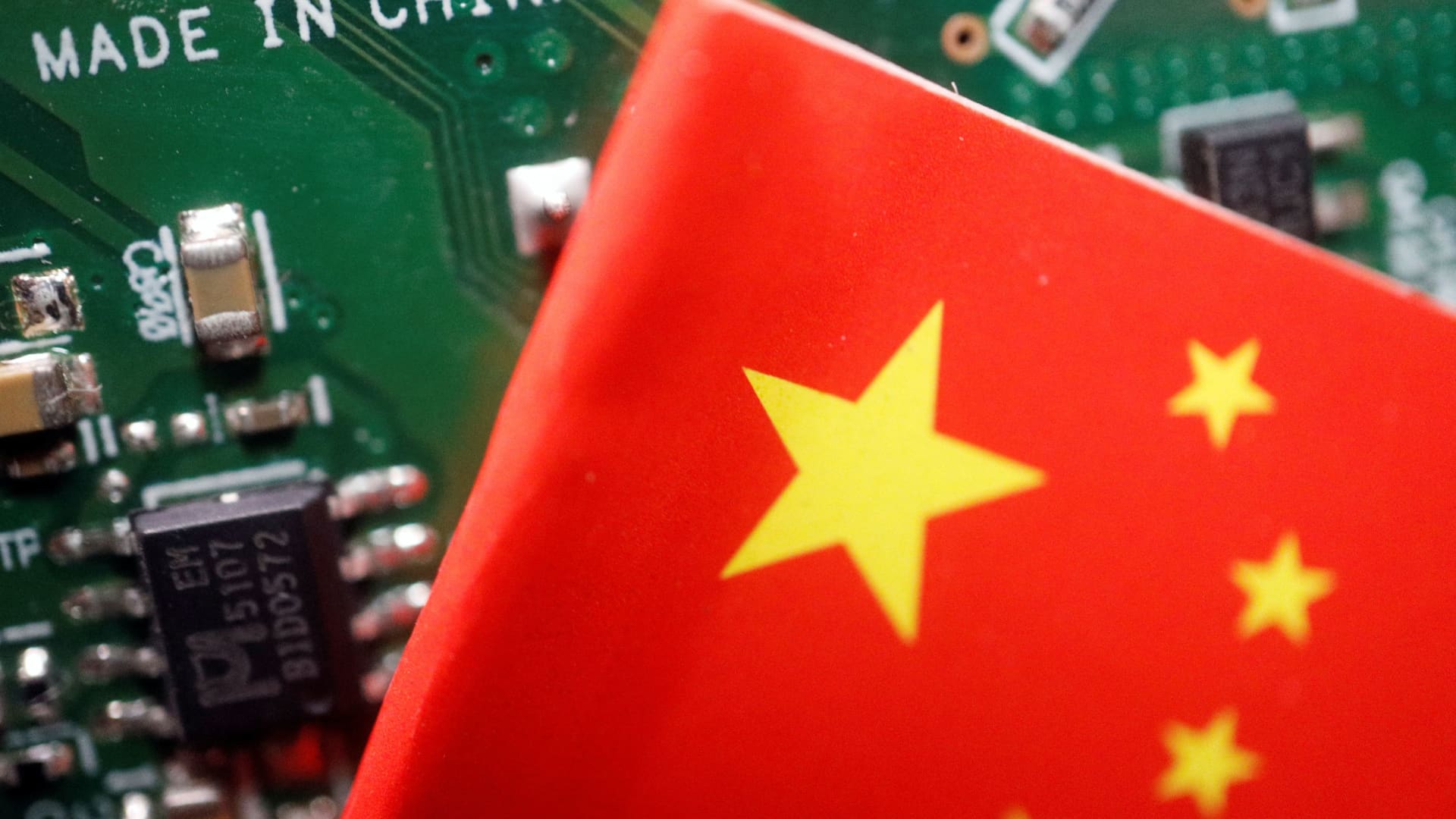A Chinese flag is displayed next to a “Made in China” sign seen on a printed circuit board with semiconductor chips, in this illustration picture taken February 17, 2023.
Florence Lo | Reuters
China could face more semiconductor export curbs from the likes of the U.S. and the Netherlands to contain the Asian powerhouse’s chip tech, analysts told CNBC.
Earlier this year, the Netherlands blocked Dutch semiconductor equipment maker ASML from exporting some of its deep ultraviolet lithography systems to China. ASML sells lithography machines that are key to manufacturing advanced chips.
It came after the U.S. tightened export controls on advanced semiconductors and chipmaking tools to China in October last year, building on previous rules. Washington is concerned that Beijing could use these advanced chips in artificial intelligence and military applications.
“I wouldn’t be surprised if there’s more [U.S. restrictions] coming just because we’re still in the middle of this tit-for-tat. And there’s a lot of hawks in the U.S. that are really concerned about China’s military buildup,” said Dan Hutcheson, vice chair and senior research fellow at TechInsights, on CNBC’s “Squawk Box Asia” Tuesday.
Beijing slammed the Dutch government’s move, urging the Netherlands to “uphold an objective and fair position and market principles.”
China’s Ministry of Commerce said last week that the U.S. is weaponizing export controls as a tool, adding that it is “highly concerned about the U.S.’s direct intervention” in the issue of high-tech exports by Dutch companies to China.

“It’s further evidence that not just the U.S. government, but also other Western countries like the Dutch government, are going to keep ratcheting up some of the restrictions that we’ve seen around both chipmaking equipment and also advanced semiconductors,” Chris Miller, author of “Chip War” told CNBC’s “Squawk Box Asia” in early January.
In October, the U.S. banned the sales of the A800 and H800 chips that Nvidia specifically manufactured for the Chinese market.
Nvidia’s less powerful A800 and H800 chips were developed after the U.S. government banned shipments of the A100 and H100 chips — which are advanced graphics processing units sold to businesses — to China in August 2022.
With [U.S.] elections impending and political tension continuing to exist in the Taiwan Strait, it’s hard to envision a meaningful pull back on restrictions. If anything, I see further tightening.
Daniel Newman
Principal analyst, Futurum Research
This led Nvidia to launch even less powerful chips in China in December to comply with U.S. export restrictions.
“The U.S. government has signaled that they’re planning to roll out new export controls that do close loopholes on a regular basis,” said Miller.
China’s imports of integrated circuits in 2023 plunged amid U.S. curbs, falling 15.4% year-on-year to $349.4 billion in 2023, according to customs data released on Friday (Jan. 12). Shipment volume also declined by 10.8%, the data showed.
“With [U.S.] elections impending and political tension continuing to exist in the Taiwan Strait, it’s hard to envision a meaningful pull back on restrictions. If anything, I see further tightening,” Daniel Newman, principal analyst at Futurum Research, told CNBC last week.
China opposes Taiwan independence and has urged the U.S. to “stop arming Taiwan,” according to a readout on Jan. 10.
China seeks self-reliance
Western efforts to contain China’s high-tech progress have pushed the economic giant to look to its domestic firms to be self-reliant.
Since 2019, the U.S. has slapped sanctions on Chinese tech firms such as Huawei and China’s largest chipmaker SMIC, forcing Beijing to boost its domestic industry.
Revenue of China’s top 10 chip-equipment makers surged 39% in the first half of 2023 compared to a year earlier, according to Shanghai-based CINNO Research.
“I do think the short-term provides an advantage to the West, but China will do everything in its power to be sure it isn’t left out of the chip race,” said Futurum’s Newman.
China has traditionally been dependent on foreign firms for critical components.
After the Dutch government revoked the export license of ASML, Beijing no longer has access to some of the most advanced chipmaking tools in the world.
China has also been barred from importing ASML’s extreme ultraviolet lithography machines, which companies like Taiwan’s TSMC need to make the smallest and most sophisticated chips.







